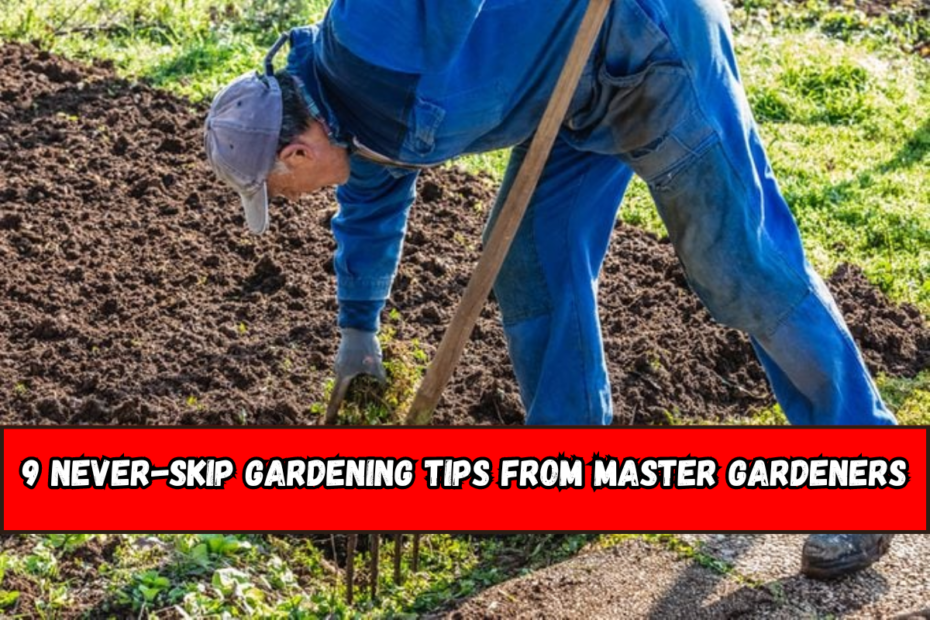9 Never-Skip Gardening Tips From Master Gardeners: Having a garden is a great way to enjoy nature, grow your own food, and make your yard look nicer. But it can be hard, especially for people who are just starting out.
9 Never-Skip Gardening Tips From Master Gardeners
Master gardeners have learned from their own mistakes what works best for gardening. You can avoid common mistakes and set yourself up for success if you listen to what they say. Here are nine important gardening tips that you should always follow.
1. Know Your Soil
It’s very important to know what kind of soil you have before you grow anything. A garden that does well needs dirt that is healthy.
You can find out about the pH level and nutrient makeup of the soil by testing it. If the tests come back positive, you may need to add organic matter to the soil, such as compost or well-rotted dung.
Making your dirt better will give your plants the nutrients they need to grow well.
2. Choose the Right Plants
It is very important to choose plants that will do well in your temperature and soil. It’s important to pick plant varieties that will do well in your area because not all plants do well in all circumstances.
Native plants are often the best choice because they are used to the weather where they live and need less care. Find the best plants for your garden by finding out what hardiness zone you live in and talking to local gardening groups.
3. Water Wisely
One of the most important parts of farming is watering. Too much water can cause root rot, and too little water can stress your plants out. The key is to water fully and less often, giving the soil a chance to dry out a bit in between.
This helps your plants’ roots grow deep, which makes them stronger. It’s best to water your plants early in the morning, before it gets too hot, so that the water doesn’t evaporate too quickly.
4. Mulch Regularly
Putting mulch around your plants is a good way to keep the soil wet and keep weeds from growing. Mulch helps keep the soil at a steady temperature, which is good for plant roots.
Adding a layer of organic soil, like wood chips or straw, of two to three inches deep can make your garden more healthy. Make sure that mulch is at least a few inches away from the bases of your plants so that it doesn’t rot and the plants grow well.
Also See: 7 stunning waterfalls to see in India
5. Fertilize Appropriately
For plants to grow and produce food, they need to be fertilized correctly. If you use organic pesticides, you can give your plants the nutrients they need without giving them too much.
If you want to grow plants, you should know exactly what nutrients they need and use fertilizers that meet those needs. Taking a reasonable approach will help your plants get the nutrients they need without hurting them.
6. Prune Correctly
Cutting back your plants on a regular basis is important for keeping them healthy and looking good. It helps get rid of diseased or dead stems, promotes new growth, and makes the air flow better.
Learning how to prune your plants correctly is important because different types of plants have different needs. To encourage good growth and flowering, pruning must be done at the right time of year.
7. Control Pests Early
Getting rid of pests is an important part of gardening. Master farmers stress how important it is to find problems early and fix them.
Check your plants often for signs of pests or diseases, and act quickly to stop issues from getting worse. Natural ways to get rid of pests, like using organic pesticides or helpful insects, can help you keep your garden healthy without hurting the environment.
8. Practice Crop Rotation
Changing the crops you grow in your vegetable yard is a good idea. This means moving your crops around every season to keep the soil from drying out and to lower the risk of pests and diseases building up.
Rotating plants helps keep the soil environment healthy because different plants need different amounts of nutrients. Planning the layout of your yard every year can improve the health of the soil and the yield of your plants.
9. Keep Learning
When you garden, you’re always learning new things. No matter how long they’ve been gardening, there’s always something new to find. Read books, go to workshops, and use the internet to learn about new gardening techniques, plant types, and ways to get rid of pests. You can get help and ideas from gardening clubs in your area as you learn more and improve your skills.
Using these nine important gardening tips from professional gardeners will help you grow a garden that thrives and adds beauty and food to your outdoor space. Have fun planting!
